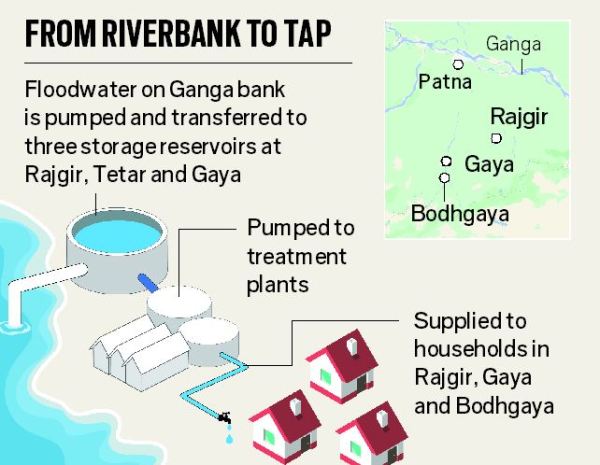Some build toilets as gift in Bihar now
4 min read More than 250 km from Patna is a nondescript village Oraiya in Maoist-infested Jhajha block of Jamui district. Some time back when young Asha Devi came to this village after her wedding, she found there was no toilet at her in-law’s house. She was told that majority of the houses in that village had no toilets, and therefore, like other women, she too would have to go the nearby field to relieve herself.
More than 250 km from Patna is a nondescript village Oraiya in Maoist-infested Jhajha block of Jamui district. Some time back when young Asha Devi came to this village after her wedding, she found there was no toilet at her in-law’s house. She was told that majority of the houses in that village had no toilets, and therefore, like other women, she too would have to go the nearby field to relieve herself.
Since there was no other woman in the family, she would ask her husband to accompany her to a nearby field every night she had to go out to attend the nature’s call. Months passed. Somewhere down the line, Asha was getting increasingly frustrated over the non-existence of toilets either at her husband’s home or in the neighbourhood.
One fine morning, she left for her parents’ place. For nearly 10 months, she did not return to her in-laws’ place till ward member Munaiza Khatoon intervened and helped a patch-up between the two families. It was agreed upon that a toilet would be constructed there at the earliest under the state government’s Lohia Swachchta Yojna or under the Central Government’s Nirmal Bharat Abhiyan.
Eventually, Asha returned to her in-law’s place. Her story later inspired a Muslim woman of Sirdala in Jamui and she too insisted on construction of a toilet in her house as she felt that this would be the best gift to her newly-wed sister-in-law. “For years, I have suffered the pain, agony and shame of going out in other’s field/land to relieve myself. This should not happen with my sister-in-law. Instead of giving cash and gold, I thought, a toilet will be the best gift from me to the newly-wed,” she said.![]()
More and more women in Bihar are now demanding toilets at home ever since Union Minister Jairam Ramesh argued that instead of building temples, one should focus on constructing toilets.
As an important step towards sanitation for all, the Nitish regime on November 19, 2013– World Toilet Day – took an important decision. He asked all public representatives to build toilets in their houses and emphasised that Bihar would make suitable amendments in its the State Panchayat Raj Act to make availability of toilet an essential pre-requisite to contest elections for local bodies. The decision, it is believed, will go a long way in making Bihar “open defecation-free.”
“The chief minister has announced incentives and rewards for gram panchayats and block panchayats if they become open defecation-free. He has requested the Centre to consider supporting 2.13 crore households instead of 1.11 crore households under the Nirmal Bharat Abhiyaan,” Bihar’s Rural Development Minister Nitish Mishra Deccan Herald.“In the past, human rights discussions have largely ignored water and sanitation.
But after years of fierce debate, the Human Rights Council adopted a resolution on September 30, 2010 affirming that access to safe drinking water and sanitation was a human right. The recognition of the rights to water and sanitation is a major breakthrough. Now it is crucial to implement these rights and turn them into a reality for everyone and the Bihar Government is committed to the realisation of this basic human right,” the UK-educated minister said.
“Safe drinking water and sanitation are indispensable to sustain life and health, and fundamental to the dignity of all. Yet, 884 million people do not have access to improved sources of drinking water, while 2.5 billion lack access to improved sanitation facilities.This lack of access to safe water and sanitation has severe human costs, such as poor health, as well as major economic losses. The sanitation challenge in India is onerous. India is home to more than 660 million people who do not have access to safe sanitation facilities. Around four lakh children in India alone lose their lives on account of diarrhoea every year.
Bihar has been in the forefront to provide opportunities to its people to improve their sanitation services. Bihar is the only state to have an exclusive programme for sanitation known as Lohia Swachchta Yojna for people living above poverty line (APL).
It has also made a special mission, the Mahadalit Vikas Mission to attend to the needs of the poorest Mahadalits. “The mission has provision for supporting the poorest of the poor in the construction of household toilets,” Mishra said.
No wonder, the UPA government recently showered praise on the Nitish regime for its effort to eradicate the practice of open defecation and asked other states to follow Bihar model. Out of 85 lakh toilets to be built this fiscal, Bihar alone has to make 10 lakh toilets.
The Bihar Government has taken a policy decision that no house will be sanctioned to the beneficiaries under the Indira Awas Yojna (IAY) without provision for toilets.
Construction of toilets under Centre’s ambitious scheme Nirmal Bharat Abhiyan is going on in full swing where the beneficiaries get Rs 10,000 for construction of each toilet. Part of the assistance comes from Mahatma Gandhi National Rural Employment Guarantee Act (MNREGA).
Jairam Ramesh specifically mentioned Bihar during one of his meetings with the secretaries from different states where he said that the Nitish regime has been successful in implementing the schemes precisely because the state government had converged the MNREGA, Nirmal Bharat Abhiyan and IAY.
Little wonder, Nitish Kumar at a function recently asked young girls to get married only at those places where there was toilet as 90 per cent of the disease was caused due to open defecation. “When there will be toilets in each and every household, we will get rid of at least 90 per cent of the disease,” the chief minister said.Girls like Asha are out to prove him correct.
Courtesy: Deccan Herald


